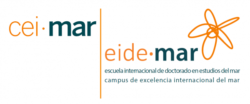Presentation of the edition
Most water-mass boundaries described in oceanography refer to transitional physical structures such as thermoclines, haloclines, surface layers, marine fronts and nepheloid layers. These ergocline regions have often been defined as areas of sharp gradients in physical and biogeochemical properties, where the rate of diffusion is a key ecological quantity. Such structures contribute to slow down the horizontal and vertical exchange of properties, including suspended particles and planktonic organisms. It has long been recognised that these structures sustain strong biotic and abiotic interactions and favour the confinement of the suspended matter which is transformed in situ by the organisms.
Many authors generalise this idea considering these boundaries as interface regions where the magnitude of the ecological flows (nutrients, organisms, matter, energy, or information) abruptly contrasts with that of the surroundings.





